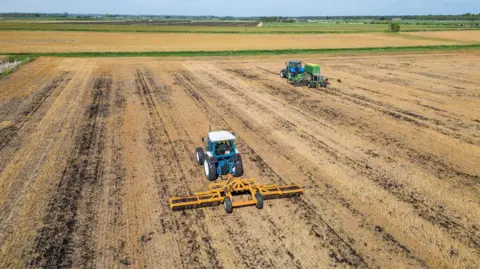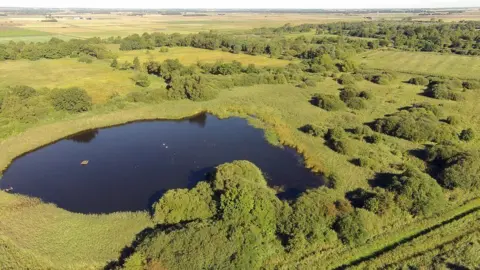Peat project hopes to save 4,000 tonnes of carbon
 Holly Wilkinson
Holly WilkinsonA major project hoping to lock up more than 4,000 tonnes of carbon in peat soil by creating a wetland has got under way.
Speechley’s Farm in the Great Fen, Cambridgeshire, was bought by the county's Wildlife Trust to help preserve soil and support wildlife.
It said peat farming was the largest source of carbon emissions in the county.
Kate Carver, Great Fen project manager, said the agricultural area “will be transformed into a nature haven with huge benefits for our climate”.
The farmland was purchased with funding from the National Lottery Heritage Fund and a major public appeal by the Wildlife Trust for Beds, Cambs & Northants.
The first stage of the project began in May as the peat soil was seeded with a mix of five native grasses.
Later in the year, grazing animals will move onto the 134-hectare site, near Ramsey, and ground work will take place next year to transform it into a wetland habitat.
Peatlands are a natural carbon dioxide sink, absorbing CO2 from the atmosphere and retaining it in the soil rather than the atmosphere.
In Europe alone, peatland locks up about five times more carbon than forest.
 Henry Stanier
Henry StanierThe trust said East Anglia had lost 99% of its wet fenland as result of drainage, and its "Great Fen vision” aimed to link up some of the remaining fragments.
It hoped to create a new 14-square-mile (36-sq-km) peat landscape that would provide for "lost wildlife" as well as trialling crops that can grow in wet soil.
Ms Carver said: "In time, this land will become home to wetland birds like redshank and snipe as well as insects, wildflowers, otters and many other species."
Lorna Parker, Great Fen restoration manager, said many farmers were "looking to the future" to manage the land sustainably while still producing a commercial crop.
"This project will help provide the answers they need," she said.
“This is a very special moment as the first seeds are sown on the journey towards turning this land into a thriving wetland habitat.
“The grass will secure the soil, locking in the carbon and laying the foundations for the exciting work happening over the next few years."
Follow Cambridgeshire news on Facebook, Instagram and X. Got a story? Email [email protected] or WhatsApp us on 0800 169 1830
